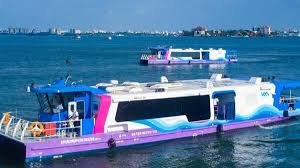Kochi Metro Rail Limited (KMRL) has announced an ambitious plan to power both the Kochi Metro and Water Metro entirely through solar energy by 2030. This visionary move positions Kochi as a national pioneer in energy-neutral public transit.
A major highlight of the initiative is the upcoming 17 MW solar farm in Puthukkad, Alappuzha, spanning 90 acres. Inspired by the Cochin International Airport’s solar model, this farm will supply clean energy to the Kerala State Electricity Board (KSEB), which will in turn power Kochi’s growing Water Metro fleet.
Supporting this mission, rooftop solar panels will be installed at all Water Metro terminals, including the Vyttila Operational Control Center. Installations at terminals like the High Court are already underway and expected to be completed within six months.
The hybrid Water Metro boats currently rely on Lithium Titanate Oxide (LTO) batteries, with conventional fuel reserved for emergencies. Once the solar grid is fully operational, these boats will be powered entirely by green energy.
Since its launch in 2017, Kochi Metro has already been a solar frontrunner, sourcing 55% of its energy from solar plants. To further this goal, a 50-acre solar facility in Kasaragod is being developed, with implementation by agencies like INKEL.
KMRL’s target includes cutting 22,800 tonnes of CO₂ emissions, with 20% of the goal already achieved. The agency is also exploring hydrogen fuel technology to boost its clean energy capabilities.
As of now, KMRL has installed 10.5 MW of solar capacity, supplying nearly 50% of its energy needs from renewables. At full rollout, the Water Metro will operate 78 boats across 76 kilometers, although only 19 boats across 4 routes are currently in operation.
This visionary project not only promises clean and efficient travel for the people of Kochi but also serves as a model for environmentally responsible urban transit across India—preserving the region’s backwaters, rivers, and lakes for generations to come.




